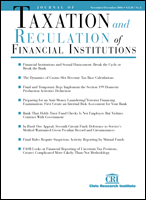Complete Issue
Author: Houman B. Shadab.
Source: Volume 25, Number 05, May/June 2012 , pp.1-60(60)

< previous article |return to table of contents
Abstract:
Our first article, by Kevin F. Powers and John E. Cederberg, considers in detail the tax consequences of S corporation bank sales to the selling corporation, its shareholders, and the buyers. This article should be of special interest to community banks, which are often organized as S corporation banks and which currently face challenges that may make sales and acquisitions more attractive. Banks large and small are likewise facing increasing challenges in the form of lawsuits filed by the Federal Deposit Insurance Commission (FDIC). In our second article, Mary Gill, Robert Long, Mark Kanaly, and Todd Chatham review emerging trends in FDIC suits against former directors or officers of failed banks. Importantly, the authors discuss the affirmative defenses available to directors and officers that may assist them in defeating FDIC claims against them. When financial institutions face tax controversies with the Internal Revenue Service, their choice of whether to engage in litigation or an alternative method of dispute resolution turns on several factors, including cost and reputational damage. Our third article, by Todd Welty, Mark Thomas, and Denise Mudigere, reviews the various types of alternative dispute resolution mechanisms available to taxpayers. This discussion is particularly relevant to financial institutions, which are operating in a tax compliance environment that is increasingly complex and dynamic. Making loans is a fundamental activity of banks and other financial institutions, and in our fourth article Christopher Dorman provides a primer of some of the most important terms of commercial loans; namely, representations, warranties, and covenants. Although these provisions are basic to any commercial lending agreement, the article is particularly relevant today given that ongoing changes in the structure and nature of credit markets may impact the way such provisions are negotiated, drafted, and priced in secondary markets. In September of 2012, the Second Circuit Court of Appeals will decide whether a district court’s rejection of a settlement between the Securities and Exchange Commission (SEC) and the Citigroup was proper. In our fifth article, Ernest Badway and Daniel Schnapp review the SEC’s use of obey-the-law injunctions, which the Commission typically issues pursuant to such settlements. The authors note various flaws with the SEC’s approach and suggest one that is more likely able to withstand judicial scrutiny. This issue ends with a U.S./International column by Alan I. Appel that discusses the tax issues foreign investors in U.S. real state should consider under the Foreign Investment Real Property Tax Act of 1980.Keywords: S Corporation Bank; FDIC Litigation; Director Liability; Alternative Dispute Resolution; Commercial Credit Agreements; SEC Obey-the-Law Injunctions; FIRPTA
Affiliations:
1: New York Law School.